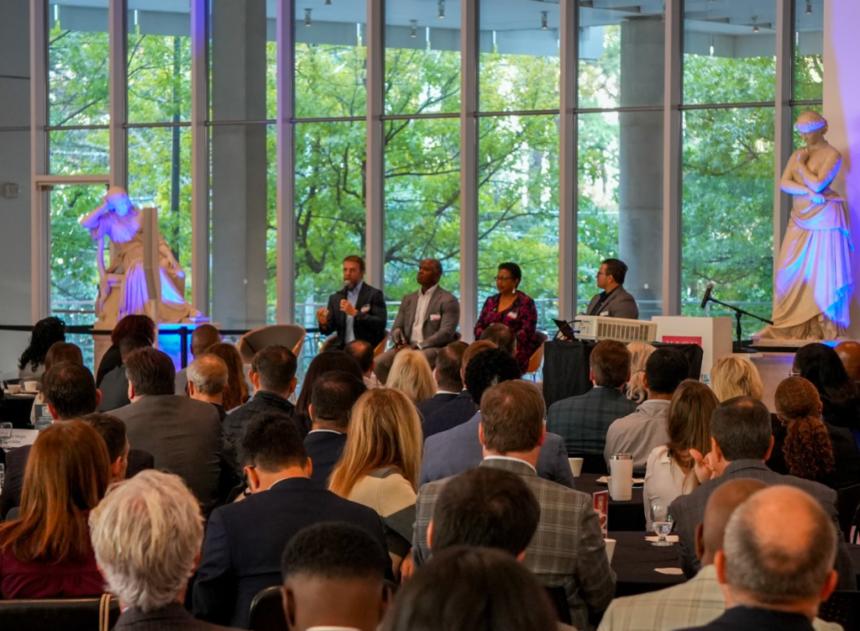
 3 min read October 2024 — Higher education is evolving to meet workforce needs, contributing to economic growth in Greater Atlanta.
3 min read October 2024 — Higher education is evolving to meet workforce needs, contributing to economic growth in Greater Atlanta.
At the Focus: Atlanta 2024-2025 Launch Conference, the second panel “Impact and Excellence: The evolving role of higher education in shaping top talent and Greater Atlanta’s future,” brought together thought leaders to discuss innovative strategies and the critical role of educational institutions in workforce development. Moderated by Eloisa Klementich, president and CEO of Invest Atlanta, the panel included Georj Lewis, president of Clayton State University, and Michael Thurmond, CEO of DeKalb County.
“How can we remain competitive as a state? We have plenty of educational institutions that provide ample opportunities for workforce development,” Klementich said, emphasizing the importance of aligning education with industry needs. “Some employers are saying there is a skills gap between what they need and what individuals are equipped with. It’s more important than ever to have conversations about this,” she added.
The state continues to demonstrate strong economic expansion and strategic investments, with counties across the region emerging as national powerhouses. Fulton County recently climbed to No. 4 in Site Selection Magazine’s Top 20 Best Counties in America rankings by total points, with Gwinnett County securing 5th place in points per capita, highlighting Metro Atlanta’s role in driving job creation and growth. Other Georgia counties, such as Decatur, Candler, Banks, and Chatham, also ranked on these lists, reflecting the region’s appeal for investment, largely thanks to robust population growth and a diverse economic base, which enables the area to drive job creation and economic development.
Building on Klementich’s remarks, Lewis highlighted the role of data-driven decision-making in adapting curricula to meet workforce demands. “The first step is to listen to feedback and embrace the data we have. Discussions about workforce development are essential for us to listen and make curriculum changes. Higher education used to be slow to change, but that is no longer the case. We are evolving towards what students and industry need,” he said.
Reflecting on this issue in a recent interview with Focus:, Lewis expanded on the importance of education in improving students’ lives. “Social mobility is at the forefront of everything we do as well as an integral part of our strategic plan. We want students to not only enroll, but to graduate. (Once they do) they should have the skill set and opportunity to move their families to a higher point in a positive way. Those graduates should be able to move into higher-paying careers that change their lives, their families’ lives, as well as their communities for future generations.”
Despite the region’s economic strengths, Metro Atlanta faces challenges regarding upward mobility. A recent study by Opportunity Insights, which tracked the income of individuals born into low-income households in 1978 and 1992, showed a troubling trend: incomes decreased by 5.2% between the two groups. Today, a native Atlantan born into poverty is more likely to be in a worse financial position by age 30 compared to their predecessors a decade ago. The report ranks Atlanta 50th out of the 50 most populous metros for upward mobility, underscoring the need for education and workforce initiatives to break these cycles of poverty.
Addressing this issue, Thurmond shared his perspective in an interview with Focus:, stating, “A child born to impoverished parents shouldn’t be sentenced to a lifetime of deprivation and despair. If we can alleviate these debilitating pathologies, we will unleash an unending cycle of growth and prosperity.”
During the panel, Thurmond emphasized the vital role that education and job creation play in breaking these cycles. “Georgia is a place where people come to find jobs. At the core of who we are is creating jobs and economic opportunities, and Metro Atlanta excels at this. It’s important to engage children in opportunities. That is how we grow the economy, create jobs, and build the 21st-century workforce.”
Both panelists emphasized the importance of inclusivity in education going forward. Lewis pointed out, “Exclusiveness instead of inclusiveness has long been the case in education. 80% of Black and Brown students attend school part-time because they are working, sometimes full-time. When we talk about diversity, it’s not just income and race, but also students with children or those who work.”
Thurmond echoed this sentiment, reinforcing the importance of creating accessible pathways for students. “We must invest in the pipeline that creates opportunities for young people and ensure access to quality education. Access is key,” he concluded, highlighting the long-term impact of equitable educational opportunities on the region’s economic future.
For more information, visit:










